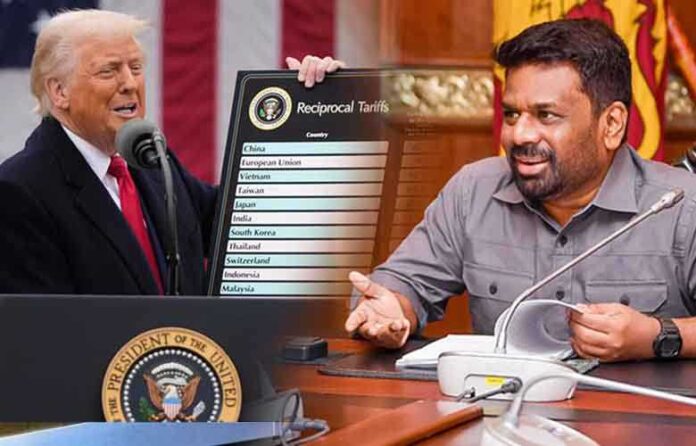By: Staff Writer
April 17, Colombo (LNW): Sri Lanka is preparing to send a high-level delegation to Washington next week for direct negotiations with the United States Trade Representative (USTR) following the Trump-era decision to impose a steep 44 percent tariff on Sri Lankan exports. The move, however, has drawn criticism from economists and trade experts who describe the government’s approach as delayed, fragmented, and lacking strategic foresight.
The U.S. currently accounts for nearly 25 percent of Sri Lanka’s total exports, with the apparel and textile sectors most at risk. The newly imposed tariffs threaten to severely disrupt this key export channel, potentially destabilizing employment and economic performance.
Despite the gravity of the situation, Sri Lanka’s response has been notably sluggish compared to other developing countries. Nations such as India, Vietnam, and Bangladesh engaged U.S. officials promptly, mounted strong diplomatic offensives, and made evidence-based appeals for relief or exemption. In contrast, Sri Lanka failed to act decisively, missing the opportunity to influence U.S. policymakers at an early stage.
Export Development Board (EDB) Chairman Mangala Wijesinghe confirmed the upcoming visit, stating that the delegation would present Sri Lanka’s concerns and attempt to chart a path forward to protect the country’s economic stability. He noted that the initiative follows a series of virtual meetings with U.S. authorities and the appointment of a special presidential committee tasked with evaluating the full implications of the tariff decision and formulating urgent countermeasures.
The government’s decision to send a separate high-powered team solely for this purpose has raised questions about coordination and resource management. A senior Sri Lankan delegation, which includes officials from the Ministry of Finance, the Central Bank, and the Ministry of Foreign Affairs, is already scheduled to be in Washington from April 21 for the IMF Spring Meetings. Observers argue that this group is well-positioned to handle the tariff discussions as part of broader economic diplomacy efforts.
Critics suggest that dispatching two different delegations signals poor inter-ministerial communication and unnecessary duplication of efforts. It reflects weak coordination at a time when Sri Lanka should be projecting a united and efficient front to international partners. Moreover, the additional expenditure involved in sending a second team has been deemed avoidable and counterproductive.
The special committee appointed by President Anura Kumara Dissanayake includes a mix of senior government officials and private sector leaders. Among its members are Senior Economic Adviser to the President Duminda Hulugamuwa, Central Bank Governor Dr. Nandalal Weerasinghe, Finance Secretary Mahinda Siriwardana, Trade Secretary A. Wimalaneththiraja, and Senior Director General of the Ministry of Foreign Affairs Dharshana Perera. Also included are EDB Chairman Wijesinghe, Brandix CEO Ashroff Omar, MAS Co-Founder Sharad Amalean, Lanka Garments MD Saif Jafferjee, Michelin Lanka’s Head of Legal and Public Affairs Nilanthi Weliwe, Labour Minister Dr. Anil Jayanta Fernando, and Deputy Finance Minister Dr. Harshana Suriyapperuma.
Wijesinghe indicated that the discussions thus far have explored both the economic rationale behind the U.S. tariffs and their wider implications for developing economies. The delegation is expected to seek continued relief beyond the current 90-day tariff reduction to 10 percent and pursue long-term trade cooperation mechanisms, regulatory alignment, and enhanced engagement with the U.S. market.
As Sri Lanka attempts to navigate this crisis, experts are urging the government to develop a more cohesive and proactive trade diplomacy strategy. Calls are growing for stronger inter-agency collaboration and a clearly defined national approach to counter future economic shocks.
Without a consolidated response and clear leadership, analysts warn that Sri Lanka risks losing further ground in global trade negotiations—particularly in times of rising protectionism and shifting geopolitical priorities.

